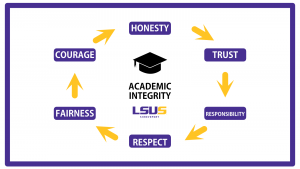1 What is Academic Integrity?
Academic Integrity
Academic integrity: A shared responsibility
As a student at LSUS you are part of an academic community that is governed by the fundamental principles of academic integrity. It is important for all members of this community, professors and students alike, to uphold these principles for the advancement of academic scholarship and the continued building of knowledge.
Why you should care

Completing a degree, diploma, or certificate program is an endeavor that requires a great deal of hard work and dedication. By maintaining your own integrity and upholding LSUS’s standards of academic integrity, you will achieve a true representation of the effort you put into your studies. As a graduate of LSUS, you will reflect on your time in college with pride over your achievements and confidence in the knowledge that you maintained your reputation as well as the reputations of your peers, instructors, and university.
A student who prioritizes integrity is also a well-prepared student for the workforce. By putting the necessary time and effort into your classes, you will gain valuable knowledge and skills to help you find success in your future career.
So what does academic integrity mean?
The International Center for Academic Integrity describes the need for the academic community to maintain six values as part of a commitment to academic integrity (4):
- Honesty
- Trust
- Fairness
- Respect
- Responsibility
- Courage
The following information defines the six academic integrity values and gives you various real-life scenarios to illustrate appropriate and inappropriate actions. The scenarios are adapted from the Integrity Matters app (MusicCentric Technologies).
Honesty
Honesty is the first step to academic integrity. Students demonstrate honesty by respecting university policies, following the instructions of their professors, and completing their work without unauthorized help. Honest students avoid dishonest behaviors such as lying, cheating, fraud, theft, impersonating another person, and falsification of data. Just as students are expected to be honest in their work, faculty, staff, and the university as a whole must also practice honesty to build a community focused on integrity.
Sort the following examples into honest and dishonest behaviors.
Trust
By practicing honesty, you will build a relationship of trust both with your peers and your instructors. Trust develops over time and is mostly based on your actions. For example, a student who repeatedly submits work that is honest and created without falsification will establish trust with their instructor. Likewise, instructors build trust by being transparent in their assignments and fair in their grading practices. Trust is also reciprocal; to develop trust in others, we must first act in a way that inspires trust in our own work.
Fairness
A person of integrity is fair. You are fair to your peers when you do your own work, to authors when you acknowledge their work through citation, to the university when you respect and follow academic integrity standards, and to alumni when your behavior helps to support the value of their degrees. Fairness is also critical at the level of the university. By developing clear and reasonable policies to guide students and faculty in matters of academic integrity, LSUS ensures that all students are treated consistently and equitably.
Respect
Respect, both for oneself and for others in the academic community, is another necessary component of integrity. As a student at LSUS, you will frequently encounter diverse opinions and viewpoints that may differ drastically from your own. You show respect in these instances by recognizing the value of contradictory ideas and accepting the differences of others. A student with respect actively engages in the learning process and expresses interest in gaining new knowledge. They listen to the opinions of others while also sharing their own ideas in a civil manner. Respectful, friendly debate is an integral part of the college experience. Other ways of showing respect include adhering to assignment instructions, crediting others for their ideas, and showing that you are putting your best efforts forward.
Responsibility
Responsibility for academic integrity is shared by all members of the LSUS community, including students, faculty, and administrators. A responsible student is accountable for their actions. This means taking the time to learn campus policies and rules, applying them to your work, and asking questions when you do not fully understand the expectations of your instructors or the university. You show responsible behavior when you lead by example, resist negative peer pressure, and discourage others from violating the principles of academic integrity.
Courage
Though more a personal quality than a value, courage is necessary to uphold personal convictions in the face of fear or temptation. Throughout your time as a college student, your courage will be continuously tested as you encounter situations with potential risks. For example, a student who fears receiving a bad grade may be tempted to pay another student to write a paper. It requires courage to resist the urge to take the “easy way out” and work independently on an assignment despite the fear of failure. By making good choices and upholding academic integrity, your courage will develop naturally over time alongside the values of honesty, trust, fairness, respect, and responsibility. Willingness to take risks, speak up against wrongdoing, and remain brave in the face of adversity are just a few ways students can demonstrate courage.
Conclusion

As these scenarios demonstrate, there is always an opportunity to do the right thing. Remember the six values of academic integrity when you encounter unfamiliar situations and ask for guidance when you are unsure how to proceed. The power to uphold academic integrity is in your hands.

